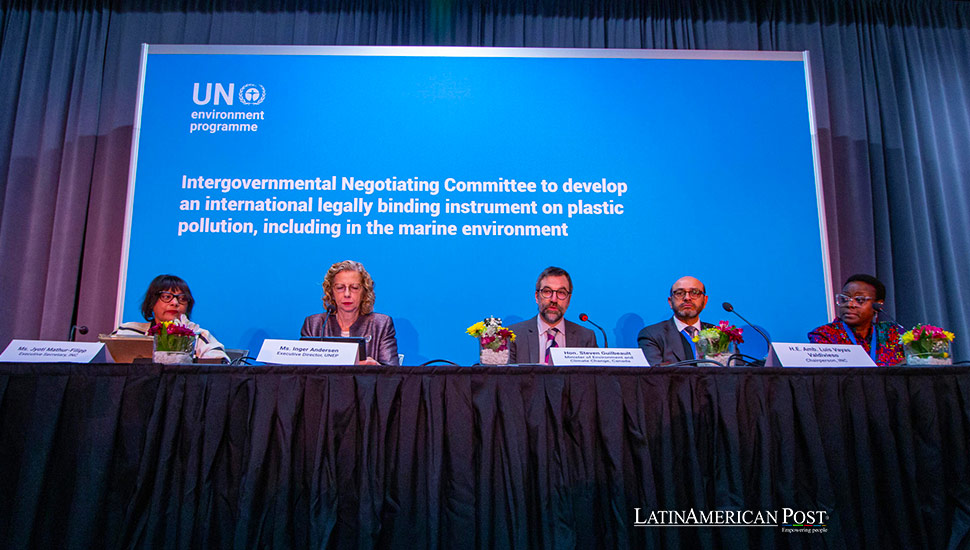Ecuador Leads Critical Global Talks on Ambitious Plastics Treaty

Under the leadership of Luis Vayas Valdivieso from Ecuador, countries are gearing up for smaller preparatory meetings ahead of a crucial December summit, aiming to finalize a groundbreaking global treaty on plastic production and waste management.
In the bustling corridors of international diplomacy, Ecuador’s Luis Vayas Valdivieso finds himself at the helm of one of our time’s most pressing environmental discussions: formulating the world’s first comprehensive treaty on plastics. As the chair of the ongoing negotiations, Valdivieso is guiding over 60 nations through complex debates centered on how to combat the escalating global plastics crisis.
Navigating Global Divides: The Ottawa Negotiations
The discussions recently unfolded in Ottawa, Canada, are at a critical juncture. Nations are divided over the treaty’s scope, notably whether it should mandate reductions in plastic production. This issue came to the forefront during the last week of negotiations when a coalition led by Rwanda and Peru and supported by the European Union and Norway, among others, voiced a strong demand for including production caps in the treaty.
These calls are driven by alarming projections: plastic production is on track to triple by 2050, a trajectory countries like Rwanda deem unsustainable. Rwanda’s chief negotiator, Juliet Kabera, emphasized that the current production rates far exceed global recycling and waste management capacities, posing severe environmental threats.
The proposal from Rwanda and Peru outlines a process for setting baseline levels of plastic usage necessary for each country, aiming to curb overproduction. This initiative underscores a growing recognition among nations of the need to shift from merely managing waste to addressing the issue’s root—unchecked plastic production.
However, this ambitious approach has met resistance from major petrochemical producers like Saudi Arabia and China. These countries argue that the negotiations should prioritize less contentious issues, such as improving waste management practices and redesigning plastic products for better recyclability. China’s lead negotiator in Ottawa, Yang Xiaoling, advocated for a focus on redesigning plastics to reduce the material used and enhance recyclability, suggesting a more conservative approach to the treaty’s objectives.
As the chair of these nuanced talks, Valdivieso’s role is pivotal. His leadership is about steering discussions and bridging diverse—and often conflicting—global interests. His strategy includes fostering smaller meetings leading to the decisive December summit in Busan, Korea. This approach aims to build consensus and refine the treaty’s details, ensuring that nations are positioned to finalize a meaningful and effective agreement when they gather at the summit.
Valdivieso’s diplomatic acumen is tested as he navigates between ambitious environmental advocacy and practical geopolitical constraints. His balanced leadership reflects Ecuador’s rising profile in international environmental diplomacy, a role underscored by the country’s unique biodiversity and its challenges and experiences with pollution and waste management.
The Ecuadorian chair’s silence on whether production limits will remain on the negotiation table has left many observers and stakeholders speculating about the possible directions the treaty could take. This uncertainty highlights the complex dynamics where environmental goals must be aligned with economic and industrial considerations.
Moreover, the implications of this treaty extend beyond environmental concerns; they touch on economic, social, and political dimensions. For countries reliant on petrochemical revenues, production caps could signal significant shifts in their financial structures. For nations grappling with pollution and waste, effective treaty measures could bring relief and set new standards in environmental governance.
In Latin America, where environmental issues are increasingly interlinked with social justice and economic development, the outcomes of these negotiations hold particular significance. The region’s extensive coastlines and unique ecosystems make it especially vulnerable to the impacts of plastic pollution, from the Caribbean shores to the Pacific and Atlantic Oceans.
Leadership Towards a Sustainable Future
The world watches closely as Luis Vayas Valdivieso continues to lead these critical discussions. The treaty’s success could be a landmark in international environmental law, potentially setting a precedent for how global governance can address complex, transboundary ecological challenges in the 21st century.
Also read: Ecuador Faces Energy Crisis and Suspends Workdays
The coming months are crucial as preparatory meetings unfold and stakeholders from around the globe align their positions. Ecuador’s role, through Valdivieso’s leadership, could very well determine the trajectory of global environmental policy concerning one of the most pressing issues of our time—plastic pollution. The hope is that by December, a robust and transformative treaty will emerge that addresses the symptoms of the crisis and its sources, paving the way for a sustainable future.





